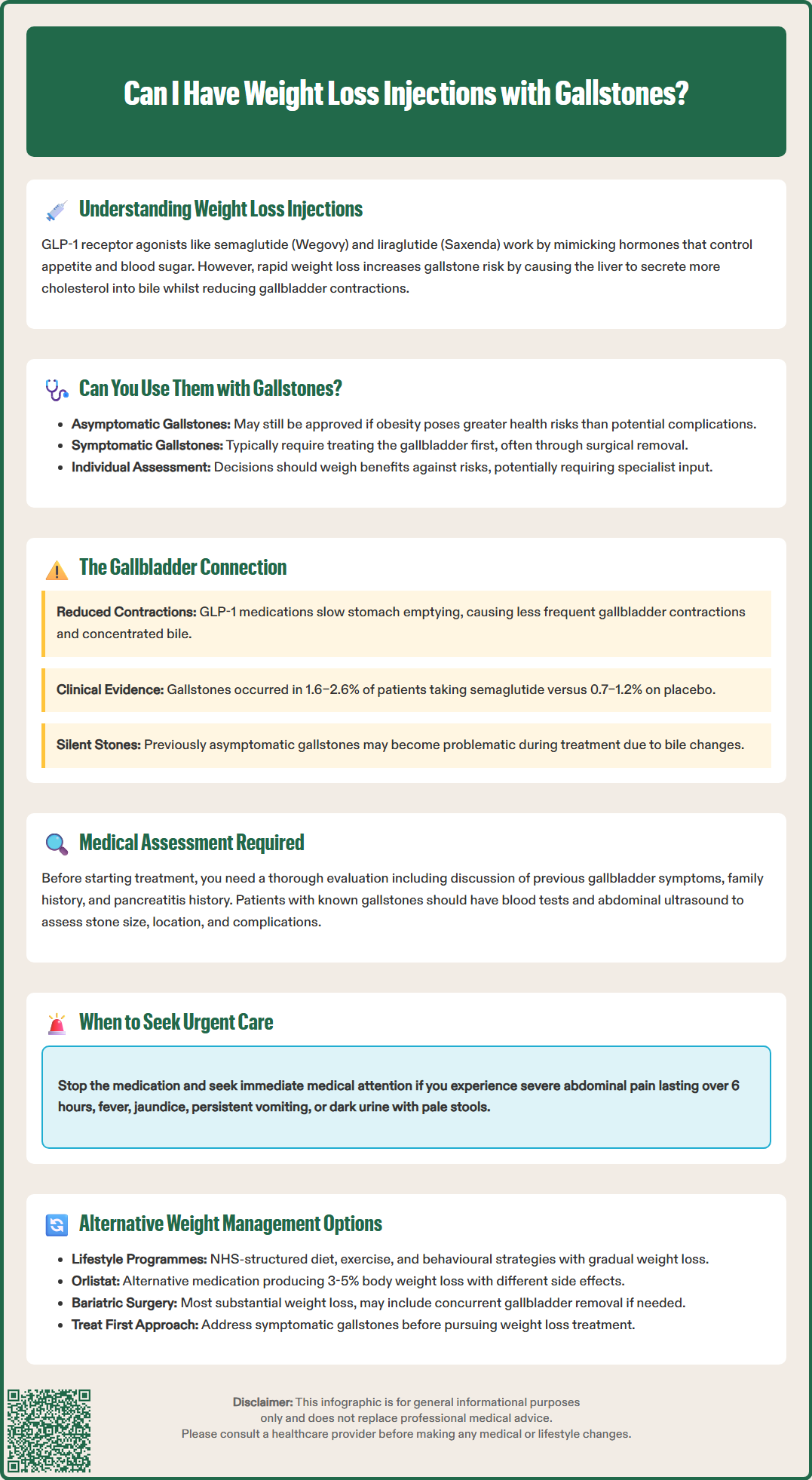
Weight loss injections such as semaglutide (Wegovy) and liraglutide (Saxenda) are increasingly prescribed for obesity management in the UK, but their use in patients with gallstones requires careful consideration. Gallstones affect 10–15% of the UK population, and rapid weight loss—a known effect of GLP-1 receptor agonists—can increase the risk of gallstone formation and complications. Whilst having gallstones is not an absolute contraindication to these treatments, individual assessment by a healthcare professional is essential. This article examines the relationship between weight loss injections and gallbladder health, guidance on safe use, and alternative options for patients with existing gallstone disease.
Quick Answer: Having gallstones is not an absolute contraindication to weight loss injections, but requires careful medical assessment and monitoring due to increased risk of gallbladder complications.
Weight loss injections, particularly glucagon-like peptide-1 (GLP-1) receptor agonists such as semaglutide (Wegovy) and liraglutide (Saxenda), are increasingly used for managing obesity in the UK. These medications work by mimicking natural hormones that regulate appetite and blood sugar levels, leading to reduced food intake and subsequent weight loss. While the MHRA has approved these treatments for adults with a body mass index (BMI) of 30 kg/m² or above, or 27 kg/m² with weight-related health conditions, NHS access through NICE guidance has more specific commissioning criteria.
Gallstones are solid deposits that form in the gallbladder, affecting approximately 10–15% of the UK population according to NICE Clinical Knowledge Summaries. They develop when bile contains excessive cholesterol, bilirubin, or insufficient bile salts to keep these substances dissolved. Many people with gallstones experience no symptoms, whilst others may develop biliary colic, cholecystitis, or other complications requiring medical intervention.
The relationship between weight loss and gallstone formation is well-established in medical literature. Rapid weight loss increases the risk of developing gallstones by altering bile composition and reducing gallbladder motility. This occurs because during significant caloric restriction, the liver secretes more cholesterol into bile whilst the gallbladder contracts less frequently, creating conditions favourable for stone formation.
For individuals considering weight loss injections, understanding this connection is essential. Clinical trials of GLP-1 receptor agonists have reported gallbladder-related adverse events, including cholelithiasis (gallstone formation), cholecystitis (gallbladder inflammation), and pancreatitis occurring more frequently than in placebo groups. The MHRA product information for both semaglutide and liraglutide includes specific warnings about these risks, prompting healthcare professionals to carefully evaluate gallbladder health before initiating treatment.

Mounjaro® is the most innovative GLP-1 medication proven to dramatically curb appetite, hunger, and cravings to help professional men achieve substantial weight loss.
Start Here
Wegovy® is a weekly injectable GLP-1 medication with proven effectiveness in reducing appetite, hunger, and cravings to help busy professionals lose significant weight.
Start HereHaving pre-existing gallstones is not an absolute contraindication to weight loss injections, but it requires careful medical assessment and monitoring. According to the MHRA Summary of Product Characteristics for both semaglutide and liraglutide, gallstones are not listed as contraindications, though both include warnings about increased risk. The decision depends on several factors, including whether your gallstones are symptomatic, the severity of previous gallbladder complications, and your overall health status.
If you have asymptomatic gallstones (discovered incidentally on imaging but causing no symptoms), your GP or specialist may still consider weight loss injections appropriate, particularly if obesity poses greater health risks than potential gallbladder complications. However, you should be informed about warning signs of gallbladder problems and the importance of reporting symptoms promptly.
For individuals with symptomatic gallstones—those causing biliary colic, inflammation, or other complications—the situation requires more cautious evaluation. Many clinicians recommend addressing the gallbladder condition first, potentially through cholecystectomy (surgical gallbladder removal), before initiating weight loss medication. This approach eliminates the risk of exacerbating existing gallbladder disease during treatment.
Patients with a history of acute cholecystitis, gallstone pancreatitis, or bile duct obstruction typically require specialist gastroenterology or hepatobiliary surgical input before starting weight loss injections. These conditions indicate more severe gallbladder disease that could be aggravated by rapid weight loss.
NICE guidance on obesity management emphasises individualised treatment decisions, weighing potential benefits against risks for each patient. Your healthcare provider will consider your complete medical history, current symptoms, and treatment goals when making recommendations.
Warning signs requiring urgent medical attention include severe abdominal pain lasting more than 6 hours, fever or chills, yellowing of the skin or eyes (jaundice), persistent vomiting, or dark urine with pale stools. If these occur during treatment, you should stop taking the medication and seek immediate medical care through your GP, NHS 111, or A&E as appropriate.

GLP-1 receptor agonists may influence gallbladder function through multiple mechanisms. These medications slow gastric emptying and reduce food intake, which may lead to decreased stimulation of gallbladder contraction. When the gallbladder contracts less frequently, bile can become more concentrated and stagnant, potentially increasing the likelihood of cholesterol crystallisation and stone formation.
Clinical trial data reveals important patterns. In the STEP trials evaluating semaglutide for weight management, cholelithiasis occurred in approximately 1.6–2.6% of participants receiving the medication compared to 0.7–1.2% receiving placebo, according to the European Medicines Agency assessment report. Cholecystitis rates were similarly elevated. Whilst these percentages represent a relatively small absolute risk, they indicate a statistically significant increase that clinicians must consider.
The rate and magnitude of weight loss appear to be important factors. Participants losing weight more rapidly showed higher incidences of gallbladder complications. This observation aligns with broader evidence that rapid weight loss substantially increases gallstone risk, regardless of the weight loss method employed.
Existing gallstones may become symptomatic during treatment even if previously silent. The physiological changes that occur during weight loss—including altered bile composition and potentially reduced gallbladder motility—can trigger symptoms in stones that were previously causing no problems. Additionally, as stones shift position during weight loss, they may obstruct the cystic or common bile duct, leading to complications such as obstructive jaundice or pancreatitis.
It's important to note that weight loss itself, regardless of method, increases gallstone risk. The absolute risk of developing symptomatic gallstones during GLP-1 treatment remains relatively low for most patients, but requires appropriate monitoring and prompt attention to symptoms. The MHRA advises that suspected adverse effects should be reported through the Yellow Card scheme.
Comprehensive medical evaluation is essential before initiating weight loss injections, particularly for individuals with known or suspected gallbladder disease. Your healthcare provider should conduct a thorough clinical history, specifically asking about:
Previous episodes of right upper quadrant or epigastric pain
Symptoms occurring after fatty meals
History of jaundice, dark urine, or pale stools
Previous abdominal imaging showing gallstones
Family history of gallbladder disease
Previous gallbladder surgery or complications
History of pancreatitis or risk factors (alcohol consumption, high triglycerides)
Physical examination should include abdominal palpation to assess for tenderness in the right upper quadrant (Murphy's sign) and evaluation for jaundice or other signs of biliary obstruction.
For patients with symptoms suggestive of gallbladder disease or known gallstones, targeted investigations may include:
Liver function tests (LFTs): To assess for biliary obstruction or hepatic dysfunction
Full blood count: To identify infection or inflammation
Abdominal ultrasound: To evaluate gallstone size, number, and location, plus gallbladder wall thickness and bile duct diameter
Amylase or lipase: If there is any suspicion of previous pancreatitis
Serum triglycerides: Particularly if pancreatitis risk assessment is indicated
If imaging reveals complicated gallstone disease—such as a packed gallbladder, large stones, gallbladder wall thickening, or bile duct dilatation—referral to general surgery or gastroenterology is appropriate before considering weight loss medication. Suspected acute cholecystitis or obstructive jaundice requires same-day surgical assessment.
Your clinician should discuss the balance of risks and benefits specific to your situation. For some patients, the cardiovascular and metabolic benefits of significant weight loss outweigh gallbladder risks, particularly if monitoring protocols are established.
Informed consent is crucial. You should understand the potential for gallbladder complications, recognise warning symptoms, and know when to seek urgent medical attention. If severe persistent abdominal pain develops during treatment, GLP-1 medication should be withheld pending medical assessment. Documentation of this discussion protects both patient safety and clinical governance standards.
For individuals with gallstones who cannot safely use weight loss injections, or who prefer alternative approaches, several evidence-based options exist within NHS pathways.
Structured lifestyle modification programmes remain the foundation of obesity management. NICE recommends multicomponent interventions combining dietary changes, increased physical activity, and behavioural strategies. These programmes aim for gradual weight loss, which may reduce gallstone risk compared to rapid weight reduction. NHS-funded programmes like the NHS Digital Weight Management Programme provide accessible support for eligible patients.
Orlistat, a lipase inhibitor that reduces dietary fat absorption, represents an alternative pharmacological option. It produces more modest weight loss than GLP-1 agonists (typically 3–5% body weight). However, orlistat can cause gastrointestinal side effects and may theoretically affect absorption of fat-soluble vitamins, requiring monitoring. It's important to note that any significant weight loss, regardless of method, carries some risk of gallstone formation.
Bariatric surgery offers the most substantial and durable weight loss but requires careful consideration in patients with gallstones. Some UK bariatric surgeons may perform concurrent cholecystectomy during procedures like sleeve gastrectomy or gastric bypass if symptomatic or complicated gallstones are present, though routine removal of asymptomatic gallstones is not standard practice in the UK. NICE guidance supports bariatric surgery for adults with BMI ≥40 kg/m² or ≥35 kg/m² with obesity-related conditions who have not achieved sustained weight loss through non-surgical measures.
Management of symptomatic gallstones followed by weight loss treatment represents another strategy. For patients with symptomatic gallstones requiring treatment regardless of weight loss plans, addressing the gallbladder condition first creates opportunities for subsequent obesity management. Prophylactic cholecystectomy for asymptomatic gallstones is generally not recommended in UK practice solely to facilitate weight loss treatment.
Your GP can coordinate referrals to appropriate specialists—general surgery for symptomatic gallstone management, tier 3 weight management services, or bariatric surgery assessment—ensuring comprehensive, sequenced care tailored to your individual circumstances and preferences. Access to GLP-1 weight loss treatments on the NHS is governed by NICE Technology Appraisals TA875 (semaglutide) and TA664 (liraglutide), which specify eligibility criteria beyond the licensed indications.
Asymptomatic gallstones are not an absolute contraindication to weight loss injections, but your GP or specialist should assess your individual risk factors and establish monitoring protocols. You must be informed about warning signs of gallbladder complications and when to seek urgent medical attention.
Warning signs include severe abdominal pain lasting more than 6 hours, fever or chills, yellowing of skin or eyes (jaundice), persistent vomiting, or dark urine with pale stools. If these occur, stop the medication and seek immediate medical care through your GP, NHS 111, or A&E.
Prophylactic cholecystectomy for asymptomatic gallstones is not routinely recommended in UK practice. However, if you have symptomatic or complicated gallstone disease, many clinicians recommend addressing the gallbladder condition first, potentially through surgery, before initiating weight loss medication.
All medical content on this blog is created based on reputable, evidence-based sources and reviewed regularly for accuracy and relevance. While we strive to keep content up to date with the latest research and clinical guidelines, it is intended for general informational purposes only.
DisclaimerThis content is not a substitute for professional medical advice, diagnosis, or treatment. Always consult a qualified healthcare professional with any medical questions or concerns. Use of the information is at your own risk, and we are not responsible for any consequences resulting from its use.